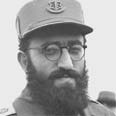

60 years later, spies' lives revealed
In 1952, Shin Bet agents were sent undercover to spy inside Palestinian villages. Keeping their real identities secret, they married Arab women, with whom they had children. Decade later, truth came to light. 'They tried to forget, but never could,' mission leader says
"Your husband is not who you think he is. He is not Arab. Your husband is a Jew who was sent into your village on a mission by the defense establishment." This was the news a few Israeli Arab women received from the head of the Mossad
mission in France in 1964. This was how they discovered that the fathers of their children were serving in a top secret Israeli unit sent to spy in their villages.
Ten Jewish men assimilated into Arab communities in the early 1950s, marrying local women and starting families with them, all the while serving in the Shin Bet as "mistaarvim," (literally, masqueraders) - undercover agents posing as Palestinians.
The goal of the unit, which was established in 1952, was to have men on the inside in case a war breaks out, and the Israeli Arabs join the enemy. Shumel Moriah, a senior Shin Bet officer who came to Israel from Iraq, and had plenty of experience smuggling Jews into Israel, led the unit. He recruited 10 other Iraqi-born men for the complex mission.
The unit was disbanded over a decade after its establishment, which was when the wives were informed of the deception. Most of them converted and lived in Israel as Jews. Their children were recognized as Jews without undergoing an official conversion procedure.
Double life, cover story
The training process took one year; the men learned the Palestinian dialect, studied the Koran and espionage techniques in an Intelligence Corps base near Ramla. With a new identity and a detailed cover story, they were sent into Palestinian villages and cities. They pretended to be refugees from the 1948 war returning home. Their real families in Israel were kept in the dark about their whereabouts and activities; they were forbidden from trying to discover where their loved ones served.
After integrating into Arab life, village elders expected them to find a match, as per tradition. Senior Shin Bet personnel thought that the men should get married for the operation to succeed, but agreed to leave the decision up to the agents. Most of them did marry young Arab women.
"Our guys just didn't have a choice," Moriah says. "It seemed suspicious that young vigorous men would stay alone, without a spouse. When we sent them on the mission we didn't order them to marry, but it was clear to both sides that there is such an expectation, and that it would do the job better."
Shimon, the brother of one of the agents, Meir Cohen (their real names remain confidential), says that for many years, a Shin Bet representative would arrive on his parents' doorstep to personally give them Meir's paycheck, without giving them any information.
"When suddenly everything was revealed, Meir came to me and told me everything," Shimon remembers. "He told me about his cover story and about the double life. We were shocked."
Meir was sent to Jaffa, where he worked as a teacher and where he met Leila, a beautiful young Christian Arab with amazing black eyes, Shimon recalls. Meir presented himself as a Muslim. Leila was studying to be a nun when they met; they fell in love and got married. A short while later their son was born.
Leila's choice
As time passed, the pressure on the Shin Bet to return the double agents home intensified. It was becoming clear that the intelligence benefits achieved by the mission were marginal. When the Shin Bet decided to dismantle the unit, Moriah was faced with a dilemma: To leave the women and children in the Arab villages, or ask them to convert to Judaism, and raise their children as Jews? The agents themselves refused to leave their families, which is why it was decided resettle the families into Jewish areas.
The wives were brought to France, where they were finally told the truth.
"Leila realized that she was cheated, and had to undergo psychiatric treatment for a few months," Shimon says. "Only after she recovered Meir presented her with the most difficult choice that exists: To accept him as he is – a Jew and a Shin Bet agent – and raise their son as a Jew, or to leave Israel for any Arab country that she chose."
'They tried to forget, but couldn't'
Three rabbis were then brought to the Israeli embassy in Paris, including Chief IDF Rabbi Shlomo Goren, to convert the women to Judaism. Considering the special circumstances, the rabbis ruled that the children can be accepted as Jews even though their mothers were not. Their story was first told in Israel Defense, a magazine edited by Amir Rappaport.
Most of the families chose to return to Israel, and began a slow recuperation process.
"Once they returned, problems started surfacing" Moriah recalls painfully. "We tried to rehabilitate the people, but we weren't really successful. The agents' kids experienced serious trauma in their childhood. They tried to recover, to forget their past, where they come from, but they couldn't.
"A few of the kids succeeded in life, but most of them were left behind. They still suffer from problems."
- Follow Ynetnews on Facebook















